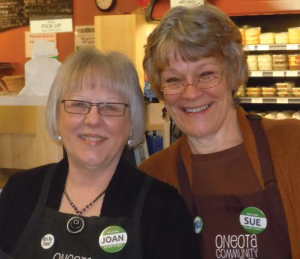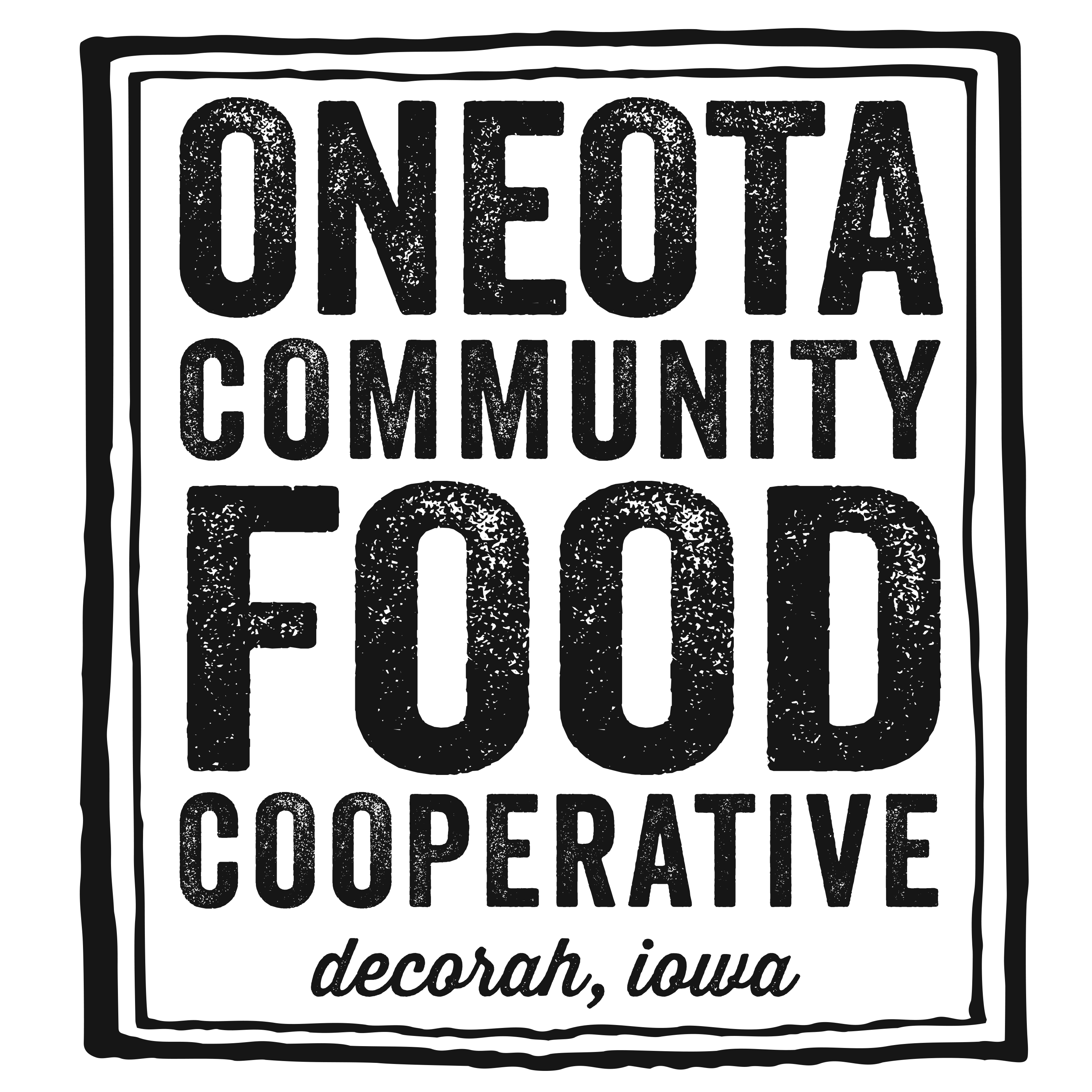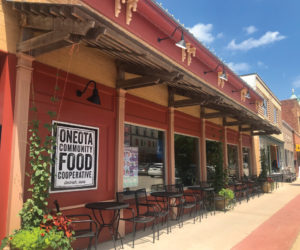By: Cerrisa Snethen – Co-op Member/Owner
Sometimes, in order to see the magnanimous beauty in the beginning, you have to start at the end. If you had walked into the Co-op on Sue Otte’s last workday just a few weeks ago, you’d have been schooled on Co-op amazingness rising again. You’d have seen Sue’s supporting cast of characters file into the Deli seating area in a farewell serenade to an employee and leader who’d helped a fledgling, tiny organization when it was still very new. And serenade they did, until Sue herself eventually joined in. Sitting down with her to learn more about her long, winding OCC Staff: Joan (left) & Sue(right)
Co-op journey, Sue reminded me why there’s much
to sing about.
I should start out by saying that Sue’s quick to point out that she’s no saint. In fact, somewhere she’s cringing on the edge of her chair right now at the compliments bestowed on her efforts in this article. But, given the fact that what goes around comes around, Sue deserves our gratitude and even a bit of our praise. Here goes: She started out in Mankato, Minnesota. It was 1948, and her formative years (the 1950’s) were nothing short of transformative and fascinating for both food and being female. The war had ended. Men were returning home ready to resume the jobs women had been doing while they were away. While Sue watched women return to kitchens that were increasingly being dominated by packaged and processed foods, in her own home her mother was still doing a lot of things from scratch. Times may have been rough financially, but Sue never knew it. “I never remember rough times because my mother was such a good cook,” she said. Uniquely, in her own neighborhood girls still outnumbered boys. She and her girlfriends ruled the roost. Perhaps these realities were instrumental in helping to develop Sue’s leadership skills and a passion for food that would one day lead her to reside on the early Co-op board as president.
Before Sue landed in Decorah though, so much had to happen. In college, she eventually decided on a path of Secondary Education via a Spanish major with an English minor, despite having a scope of interests so wide and diverse as to make the decision extremely difficult. Even then, she was cooking up casseroles with friends as she watched recipes transform from “2 cups of flour to one cup water,” to “Now add two cans cream of mushroom soup.” “To this day,” she sighs “I see something like that in a recipe, and I’m making my own mushroom sauce and flavoring it with herbs.” It wouldn’t be long before Sue was cooking for a family of her own. She met Lyle in the student union at Mankato State University.
He was fresh back from Peace Corps Columbia, and looking for someone to speak Spanish with and Sue was looking for someone with whom to have a sound intellectual relationship. “Here he was,” she smiled “My mature older man.” Sue took a teaching job in Wisconsin and luckily, Lyle came along. Soon their daughter Kristina, their marriage, and a job hunt led them to a tiny little town they’d never heard of: Postville, Iowa. A few years later, Sue and Lyle’s son Michael joined the family. Lyle taught at the local high school and Sue was enjoying raising her children. She cared about what went into the food they ate and strived to create balanced meals. One day a neighbor brought over the whole-wheat dinner rolls that would change Sue’s life. The neighbor told her that the delicious confections had been a result of whole-wheat flour she’d purchased from a tiny little Co-op in a town called Decorah about 25 minutes away. Sue couldn’t believe whole grain could taste so good. She began venturing to Decorah for more. Cooking her way through a recipe book called Laurel’s Kitchen, Sue had her family and an intellectual life. She did tutoring, helped start a pre-school, engaged with fulfilling work by coordinating activities at the local nursing home, but something was missing.
Sue needed a different community, one that more suited her personality and passions. “It was the Co-op that first drew me,” she insists. By the time Lyle and Sue settled into their new community, their kids were older. Sue started volunteering for the Co-op right away, which was then stationed upstairs in the Old Armory building on Water Street. It was a time when patrons still filled out their own slips, writing down what they took and adding up their own bill. The food was still mostly all bulk, stored in clean garbage bins. There was no white sugar. While for some folks, bulk buying was about price, for many, it was about food quality. Sue joined the Board.
In 1984 she became president of that Board, going on to serve on the collective management team they called simply “The Collective,” with Steve McCargar, Liz Rog, and Scheryl Scheffert. Sue was about to learn a lot about consensus decision-making over the more traditional system of majority rule. She remembers it being a struggle to get everyone to agree, but one that was good and worthwhile. Sue has immense gratitude for everyone who was there working alongside her in those early days. She told me about how her fellow Board member Steve McCargar worked tirelessly and was always upbeat, no matter how tough things got. This work of community building was bringing them all together toward a powerful cooperative goal.
The Oneota Co-op culture in the 80’s centered on passion for helping to educate people about food choices and being involved in the political aspects of an increasingly corporate dominated food system. Sue had always been politically passionate and involved, so her work with the Co-op was a natural extension for her proclivity to connect the dots in the swirling world around her. “It wasn’t just about food on a shelf, but how it came to be there. Who grew it? Who was determining its value and why? Who was making these choices? Food is not just food. It’s not objective. Food is subjective. It’s very much a subjective part of our culture,” she explained. But the Co-op transcended even the political—it was a substantial hub for community activity. When Sue finally resigned from The Collective and then returned to the Co-op a couple of years later to work as a cashier, it was because she loved the face-to-face interaction with the community.
“Let’s be honest,” she grinned about cashiering, “a cashier is really the face of the organization. It’s really a PR job.” Sue always loved how folks didn’t just come into the Co-op for food. They stopped in wondering if there was local land for sale, if there was music happening in the area, or looking to make connections with similarly minded individuals. “It was never just a grocery store,” she continued. “Being a welcome place for the community, a place where people could find information and resources, that’s one of the things that made our Co-op different. It also served as something of a community center. Liz Rog was such a big part of that. People would see her and ask, ‘Wow, who IS that?’ She was just so welcoming.”
Sue remembers potlucks and life changes. She remembers searching for truth. “I remember asking myself that all the time. Where’s the truth? I just want to go live there in the truth with all of its imperfection.” She remembers the time she began realizing that while Decorah was indeed the little nest she’d spent much of her life looking for—a place to settle in and be, it wasn’t everything. Living well on the journey was just as valuable. Life couldn’t just be about getting or being someplace. It had to be about living well. And helping to build the Co-op was a means of living well. The Co-op now has thousands of members who are living well through its existence. Sue certainly wasn’t alone on her journey to help build it, but she’s helped create something incredibly invaluable for the rest of us and we’re grateful.
Sue’s life seems intentional, as does the overlap of all things in it. And speaking of community building, Sue also helped to launch the Unitarian Universalist Fellowship in Decorah, where she explores philosophical and spiritual questions with people of all faiths as a spiritual community. She’s a gardener, a dancer, a singer, an activist, a reader, and she’s generally trying to get to the root. She is particularly proud of how the folks from the local UU have helped to create the Decorah Community Meal, an ongoing event that unites folks from all walks of life to break bread together. It makes sense. Communal eating is part of Sue’s general philosophy on life. She believes in food and ritual as a basic building block for our humanity, and urges the Co-op to continue engaging in education and outreach as a vehicle for knowledge and growth. While she rallies against an unsustainable centralized food system, Sue champions education as the biggest catalyst for our future “If we’re going to change.” But one thing she is not, is a purist. While Sue actively maintains her own beliefs, she insists, “I’m no moral arbiter of someone else’s life.”
Ms. Otte believes in a food system of farmers who have a respect for their animals and land. She worries about young people and their exposure to hormones, chemicals, and unhealthy examples, but she counters her worry with action. She holds up hope by being part of our Co-op and part of the greater solution. She takes what she knows and tries to translate it to folks who may be unaware or confused. “Sometimes I see myself as a translator. A cultural translator. We still have to do that,” she reminds me. All those years Sue was at the register, she considered herself less of a facilitator of a financial transaction and more of an ambassador of information. Someone with such heart and ambition is a terrific asset. She will be missed.
Here’s the great news: Sue’s not about to stop spreading awesome anytime soon. An incredibly active Decorah entity, we’ll see her fingerprints everywhere. She’s 65 and investing in new camping equipment. She’s retired and increasingly interested in learning about how to be flexible. She’s blazing new trails for the young women coming up behind her as a passionate feminist and lifelong learner. She’s setting an example for us all. Seemingly, Sue will never cease searching for a way to help others “find a way to be in the world in a way that is satisfying to their spirit.” In short, she’s thinking about all of us, all of the time. When Sue stumbles on a can of corn at a supermarket, she doesn’t look on it like an everyday object. She imagines the people who grew it, the worker who shucked it, and the women whose quick fingers operated the machine that canned it. “One of the great things about getting older,” she says “Is you can look back and see patterns and connections emerge. It’s like R.L Stevenson said (and I really believe this)—‘It’s better to travel hopefully than to arrive.’”
Thanks for incorporating us all into your journey Sue, as well as your hope. We wish you a gorgeous new beginning in this next chapter.



